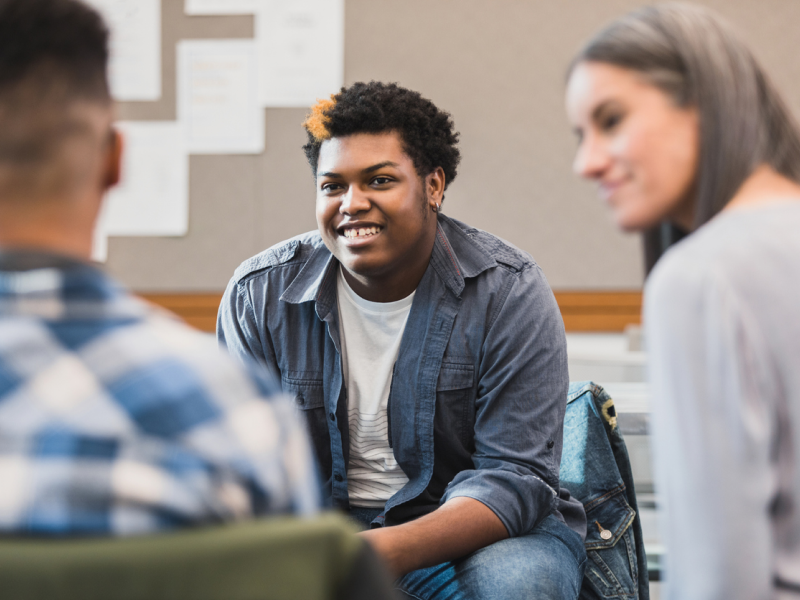
Table of Contents
Charlie Health Clients on Managing Mental Health as College Students
Written By: Charlie Health Editorial Team

Clinically Reviewed By: Dr. Don Gasparini
August 31, 2023
7 min.
Hear from college students and recent college grads who managed their mental health with Charlie Health’s virtual Intensive Outpatient Program (IOP).
Learn more about our Clinical Review Process
Table of Contents
The cultural zeitgeist’s depiction of college (with its focus on parties, football games, and crushes) tends to omit the mental health struggles commonly faced by college students. For many college students, navigating new routines and relationships while dealing with increased academic pressures can take a mental health toll. And, the state of student mental health is only getting worse, studies show. To learn more, we polled a handful of Charlie Health’s young adult alumni—all of whom are college students or recent college grads—about managing mental health at college with Charlie Health’s virtual Intensive Outpatient Program (IOP).
When did you notice your mental health struggles in college?
For some college students, the onset of mental health symptoms is insidious, marked by low energy and difficulty focusing with friends. For others, symptoms come on hard and fast—an injury that triggers an underlying mental health condition or the total inability to go to class. Here a handful of Charlie Health alumni share the signs that helped them realize they were struggling with their mental health in college.
“I realized I was struggling with depression. I kind of just shut down and didn’t know how to process or deal with emotions. I was muddling through things.” —Kiana P.
“I flunked out of school.” —Demi G.
“I’m a college athlete, and I had to get shoulder surgery, so I couldn’t play softball and had to do school at home for a semester. Not being able to be around my teammates and participate in school the way I wanted to took a huge toll on my mental health.” —Victoria L.
“I was in a depressive state and feeling pretty anxious. It wasn’t like I failed a class and could make it up the next quarter, it was like I couldn’t keep going.” —Anonymous
“I wasn’t taking care of myself. I would skip a lot of classes and not get out of bed. I wasn’t feeding myself, and I wasn’t showering. It was pretty bad.” —Jessica B.
How did you decide to get treatment at Charlie Health?
As we’ve heard from many Charlie Health clients, finding the correct kind of treatment for serious mental health conditions is challenging. College-age Charlie Health alumni share here how they chose to start our IOP—from those who heard about us in the emergency room to those who found us through an online search.
“My girlfriend found Charlie Health for me. She’s been in therapy and explained that it could benefit me.” —Nicholas P.
“I ended up in the emergency room, and the social worker there told me about Charlie Health. It sounded like the best option for me because it was more intensive than just finding a regular therapist.” —Anonymous
“I was on medical leave from school to find treatment, and Charlie Health was the first thing I found.” —Demi
“My therapist called the police to do a wellness check on me because she was concerned about what I’d told her. I ended up in the hospital for four days, and they recommended Charlie Health when I left.” —Victoria

Is college taking a toll on your mental health?
We provide virtual, intensive treatment for college students with flexible scheduling.
Can you share a skill you learned at Charlie Health that helps you manage your mental health at college?
Beyond the 9 to 12 weeks that most patients participate in Charlie Health, our program teaches skills that build long-term sustainable healing. When it comes to managing mental health at college, those skills include emotional regulation, self-empowerment, and DBT mindfulness skills. Below, a handful of alumni share skills they learned at Charlie Health that help with college mental health management.
“I’ve gotten more emotional regulation. My stressors are still there, but how I react is completely different. It feels so good to have agency over my emotions, that’s something I’ve never felt before.” —Demi
“I learned to stick up for myself. Before Charlie Health, I was not in a very good relationship. After treatment, I met up with my ex, and he said he wanted to get back together, but I told him I didn’t trust him in the way I needed for a relationship.” —Victoria
“My individual therapist at Charlie Health gave me a different perspective on my mental health and pointed out some coping skills that I already had. There’s a lot of mental health stuff that I was nervous about, and she gave me a different perspective on it.” —Anonymous
“There are so many DBT mindfulness skills that help me manage my mood. I try to stay in “wise mind” and be present when I communicate with other people.” —Nicholas
How did you balance college and Charlie Health?
As its name suggests, Charlie Health’s IOP offers intensive care—namely, 9 to 11 hours of group sessions plus individual and family therapy per week. But, our program is flexible by design, with sessions at various times that allow people to keep up with their outside-of-therapy responsibilities, including college life and college classes. Here, several alumni share how they balanced college and Charlie Health.
“I was still a student while at Charlie Health. During the day, I had classes and a million doctor’s appointments, and then I had Charlie Health from 7 p.m. to 10 p.m. at night. With all the things I was doing throughout the day, it was hard to stay awake some days, but the timing was helpful because it didn’t interfere with anything else.” —Victoria
“Charlie Health worked around my schedule at work and school. It has honestly been a life-saver. I couldn’t find a therapist within my city that had availability.” —Jazmyn S.
“Charlie Health didn’t interrupt school at all, it kind of fit in perfectly. I started during exam week, and I could do my exams, and later I could do school, and then when I came back, I’d be in therapy from 7 p.m. to 10 p.m., and then I would go to sleep right after.” —Nicholas
What is something you wish others knew about struggling with mental health at college?
Dealing with serious mental health conditions can be isolating. This can be especially true in college, where your friendships and your support system are new. After struggling with their mental health and making it through the other side, two Charlie Health alumni share what they wish others knew about struggling with mental health as a college student.
“It’s really hard to ask for help. When I’m dealing with depression, I feel like nobody loves me and nobody wants me to reach out.” —Anonymous
“I wish people were more aware of the signs that something isn’t right and would check in to make sure that students are OK. For me, there were a lot of signs that something wasn’t right—I had trouble going to classes and turning in assignments—and only one professor reached out. I ended up setting up a meeting with him, and he was extremely kind and helpful.” —Victoria

After finishing treatment at Charlie Health, how are you doing at college now?
Everyone’s Charlie Health journey is as unique as they are, meaning success after treatment looks different for every client, too. After finishing treatment, some college-aged clients return to the classroom, ready to excel. Others decide to take a break in service of their well-being. Read some of their stories below.
“I’ve already met my Charlie Health mental health goals, so I feel pretty comfortable where I am, but I definitely want to keep improving. My girlfriend and best friend have called out a lot of changes in me. They said I’m more empathetic and steady in my moods.” —Nicholas
“I ended last semester with a 3.7 GPA, so I did very well, and I’m going back to school soon. I’m going to try to do everything as normal as possible. I plan on playing softball again.” —Victoria
“Something that I’ve worked on is accepting that school is not going to be a part of my life for a while, and that’s OK. I’m hoping to go back eventually, but that’s not really on my radar right now. I have been feeling pretty good, and that’s been very nice.” —Anonymous
Mental health support for college students at Charlie Health
If you want to learn skills to take care of your mental health at college, Charlie Health can help. Our compassionate mental health professionals are here to listen to your story, understand your needs, and match you with an appropriate treatment plan that fits into your college schedule.
Charlie Health’s personalized virtual Intensive Outpatient Program (IOP) offers more than once-weekly mental health treatment for young people, including college students, who are dealing with various mental health challenges. Fill out our quick assessment to get started today.




